五升六英语语法资料
【提优拔尖】小学英语五升六暑假讲义:专题四 ---- 一般过去时(二) 译林版三起
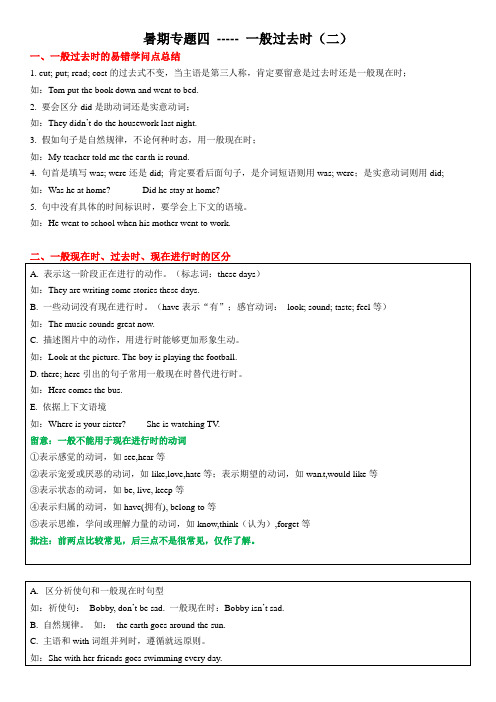
暑期专题四----- 一般过去时(二)一、一般过去时的易错学问点总结1. cut; put; read; cost的过去式不变,当主语是第三人称,肯定要留意是过去时还是一般现在时;如:Tom put the book down and went to bed.2. 要会区分did是助动词还是实意动词;如:They didn’t do the housework last night.3. 假如句子是自然规律,不论何种时态,用一般现在时;如:My teacher told me the ear th is round.4. 句首是填写was; were还是did; 肯定要看后面句子,是介词短语则用was; were;是实意动词则用did; 如:Was he at home? Did he stay at home?5. 句中没有具体的时间标识时,要学会上下文的语境。
如:He went to school when his mother went to work.A. 表示这一阶段正在进行的动作。
(标志词:these days)如:They are writing some stories these days.B. 一些动词没有现在进行时。
(have表示“有”;感官动词:look; sound; taste; feel等)如:The music sounds great now.C. 描述图片中的动作,用进行时能够更加形象生动。
如:Look at the picture. The boy is playing the football.D. there; here引出的句子常用一般现在时替代进行时。
如:Here comes the bus.E. 依据上下文语境如:Where is your sister? --- She is watching TV.留意:一般不能用于现在进行时的动词①表示感觉的动词,如see,hear等②表示宠爱或厌恶的动词,如like,love,hate等;表示期望的动词,如wan t,would like等③表示状态的动词,如be, live, keep等④表示归属的动词,如have(拥有), belong to等⑤表示思维,学问或理解力量的动词,如know,think(认为),forget等批注:前两点比较常见,后三点不是很常见,仅作了解。
五升六语法翻译知识点

一、词类:1、名词这里强调两点:不可数名词都默认为单数,所以总是用is名词复数如何加后缀:2、人称代词和物主代词人称代词:有主格和宾格之分。
一般动词前用主格,动词后用宾格。
3、指示代词4、冠词a、a n、thea和an的区别:an用于元音音素(一般就是元音字母a、e、i、o、u)前,,a用于辅音音素前。
二、否定句:be动词(am、is、are)+not情态动词can+ not助动词(do、does)+ not如何将一个肯定的陈述句改为否定句1、看句中有无be动词,如有,直接在be动词后+ not。
2、看句中有无情态动词,如有,直接在情态动词后+ not。
3、如上述二者都没有,就应用助动词+ not。
分四个步骤:(1)肯定陈述句中本来是没有助动词的,要加上去,位置在主语(某人或某物)后,动词前。
(2)确定助动词用do、does,根据句中动词,动词是原形的助动词就用do,动词是第三人称单数的助动词就用does,(3)在助动词后加not。
(4)原句中动词假如发生变化就要恢复成原形。
强调一点,有some的要考虑是否要用any。
三、一般疑问句。
如何将一个肯定的陈述句改为一般疑问句:1、看句中有无be动词,如有,把be动词提到句首即可。
2、看句中有无情态动词,如有,把情态动词提到句首即可。
3、如上述二者都没有,就应把助动提到句首。
分四个步骤:(1)肯定陈述句中本来是没有助动词的,要加上去,位置在主语(某人或某物)后,动词前。
(2)确定助动词用do还是does,根据句中动词,动词是原形的助动词就用do,动词是第三人称单数的助动词就用does(3)把助动词后提到句首。
(4)原句中动词假如发生变化就要恢复成原形。
强调一点,有some的要考虑是否要用any。
四、特殊疑问句。
表示疑问,有疑问词(在开头),回答有很多种可能。
常用疑问词:五、时态1、一般现在时(1)一般现在时中的be动词:一般用原形:am、is 、aream用于第一人称单数(I);is用于第三人称单数(he 、she 、it和其他人名或称谓,如:Ben 、his 、sister等);are用于第二人称单数(y ou)和所有复数(包括第一人称复数we、第二人称复数y ou;第三人称复数they和其他复数,如the children 、 his 、parents等)。
最新小学英语五升六授课内容整理
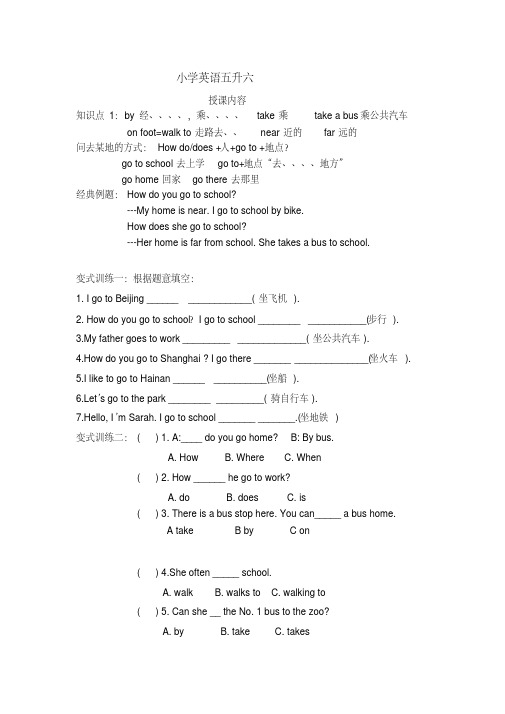
小学英语五升六授课内容知识点1:by 经、、、、,乘、、、、take 乘take a bus 乘公共汽车on foot=walk to走路去、、near 近的far远的问去某地的方式:How do/does +人+go to +地点?go to school 去上学go to+地点“去、、、、地方”go home 回家go there 去那里经典例题:How do you go to school?---My home is near. I go to school by bike.How does she go to school?---Her home is far from school. She takes a bus to school.变式训练一:根据题意填空:1. I go to Beijing ______ ____________( 坐飞机).2. How do you go to school?I go to school ________ ___________(步行).3.My father goes to work _________ _____________( 坐公共汽车).4.How do you go to Shanghai ? I go there _______ ______________(坐火车).5.I like to go to Hainan ______ __________(坐船).6.Let’s go to the park ________ _________( 骑自行车).7.Hello, I’m Sarah. I go to school _______ _______.( 坐地铁)变式训练二:( ) 1. A:____ do you go home? B: By bus.A. HowB. WhereC. When( ) 2. How ______ he go to work?A. doB. doesC. is( ) 3. There is a bus stop here. You can_____ a bus home.A takeB byC on( ) 4.She often _____ school.A. walkB. walks toC. walking to( ) 5. Can she __ the No. 1 bus to the zoo?A. byB. takeC. takes( ) 6. How does she go _______ there?A. toB./C. over( ) 7. My home is _____ our school. I can go on foot.A. not farB. nearC. far from变式训练三:根据句子意思,填上正确的单词。
【提优拔尖】小学英语五升六暑假讲义专题十 ---- 情态动词can may must的用法
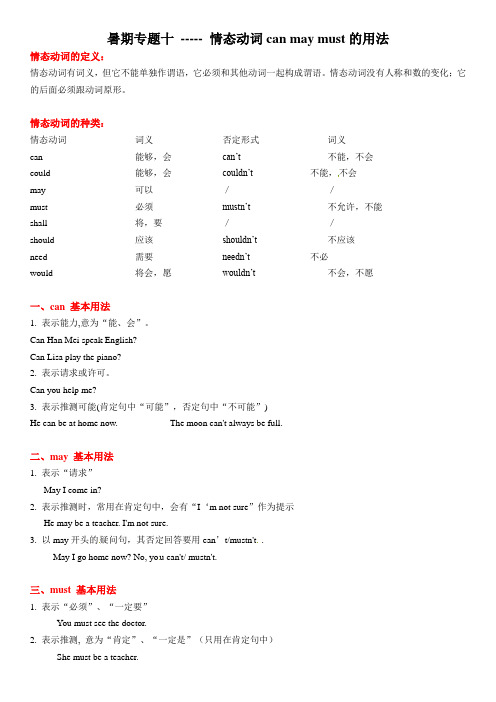
暑期专题十----- 情态动词can may must的用法情态动词的定义:情态动词有词义,但它不能单独作谓语,它必须和其他动词一起构成谓语。
情态动词没有人称和数的变化;它的后面必须跟动词原形。
情态动词的种类:情态动词词义否定形式词义can 能够,会can’t 不能,不会could 能够,会couldn’t 不能,不会may 可以//must 必须mustn’t 不允许,不能shall 将,要//should 应该shouldn’t 不应该need 需要needn’t 不必would 将会,愿wouldn’t 不会,不愿一、can 基本用法1. 表示能力,意为“能、会”。
Can Han Mei speak English?Can Lisa play the piano?2. 表示请求或许可。
Can you help me?3. 表示推测可能(肯定句中“可能”,否定句中“不可能”)He can be at home now. The moon can't always be full.二、may 基本用法1. 表示“请求”May I come in?2. 表示推测时,常用在肯定句中,会有“I‘m not sure”作为提示He may be a teacher. I'm not sure.3. 以may开头的疑问句,其否定回答要用can’t/mustn't .May I go home now? No, yo u can't/ mustn't.三、must 基本用法1. 表示“必须”、“一定要”You must see the doctor.2. 表示推测, 意为“肯定”、“一定是”(只用在肯定句中)She must be a teacher.3. 否定句中mustn’t表示“禁止”“不允许”You mustn’t smoke here.4. 以must开头的疑问句,其否定回答要用needn’t/don't have to.Must I clean the room? No, you needn't/ don't have to.四、can / may /must 表示推测的用法1. can 肯定句中,翻译为“可能”,否定句中“不可能”;2. may 肯定句中,翻译为“可能”,否定句中,翻译为“可能不”;3. must 肯定句中“一定是”记忆口诀:一肯(must),一否(can't),二不定(can / may)情态动词专项练习1. The children ______ play football on the road.A. needn'tB. canC. mustn'tD. must2. —Must I do my homework at once? —No, you ______.A. needn'tB. mustn'tC. can'tD. may not3. There's no light on. They ______ be at home.A. can'tB. mustn'tC. needn'tD. shouldn't4. —Must we finish all these articles tonight? — No, you __________.A. mustn’tB. haven’tC. not have toD. don’t have to5. How dirty the tables are! They need ________. (23届新课标模拟五级)A. to cleanB. cleanC. cleaningD. cleaned6. The children ____ play football on the road. (23届新课标模拟五级)A. can'tB. canC. mustn'tD. must7. --- You ___ park here!Look at the sign, it says “”No parking.--- Sorry, I didn't notice that sign just now. (23届新课标五级)A. won'tB. needn'tC. mustn'tD. couldn't8. We ____ pay to get into the concert. It's free. (22届新课标南京五级)A. can'tB. mustn'tC. might notD. don't have to9. --- Look, someone left a book.--- Oh, yeah ... This book _____ be Kitty's. Only she likes to read this kind of books. (22届新课标模拟五级)A. canB. mustC. mayD. might10. He isn't at school. I think he ____ be ill. (23届新课标模拟五级)A. canB. shallC. mustD. has to11. You'd better _____ late next time. (23届新课标模拟五级)A. not to beB. not beC. won't beD. don't12. --- Must I return the book tomorrow?--- No, you ______. You can keep it longer. (23届新课标南京五级)A. may notB. can'tC. needn'tD. mustn't13. --- I have oined the health club. How long do you think it will t ake me to lose ten pounds?--- In fact, I think you ____ lose weigh t step by step. (24届新课标南京五级)A. had betterB. would ratherC. prefer toD. even14. --- Sally still hasn't found her cat.--- I'm sorry to hear that. She ____ be very sad. (24届新课标五级)A. needB. shouldC. mustD. can15. --- He drives people to places. He's got a taxi.--- He _____ be a doctor. He _____ be a driver. (20届新课标五级)A. can't; canB. must; can'tC. can't; mustD. mustn't; must16. We ____ pay to get into the concert. It's free. (21届新课标五级)A. can'tB. mustn'tC. might notD. needn't17. --- Excuse me,, may I keep the book a little longer?--- Sorry, you________ return it today. (21届新课标五级)A. mustB. mustn'tC. canD. can't二、用适当的情态动词填空1. Must I borrow the book with my ID card? No, you ________.2. ________ I use your car? Yes, you ________.3. ________ I go home now? No, you _________ stay here.4. My mother is ill. I _________ stay at home and look after her.5. ________ you like some tea?6. You ________ take more exercise.7. ________ you tell me how to get to the Qingyun Park?8. The clock ________ tell us the time.9. ________ you like to go fishing with me?10. ________ we play football this afternoon?11. Must I stand up? No, you ________.12. ________ I speak something? Yes, you ________.13. ________ I leave the park now? No, you _________ stay here.14. My grandmother is ill. I _________ stay at home and look after her.15. ________ you like some juice?16. They ________ take more exercise.17. ________ you tell me the way to the museum?18. The watch ________ tell us the right time.19. ________ you like to go boating with us?20. ________ we play chess next weekend?三、按要求改写句子。
小学英语五升六暑期讲义第14讲:现在进行时(教师版)
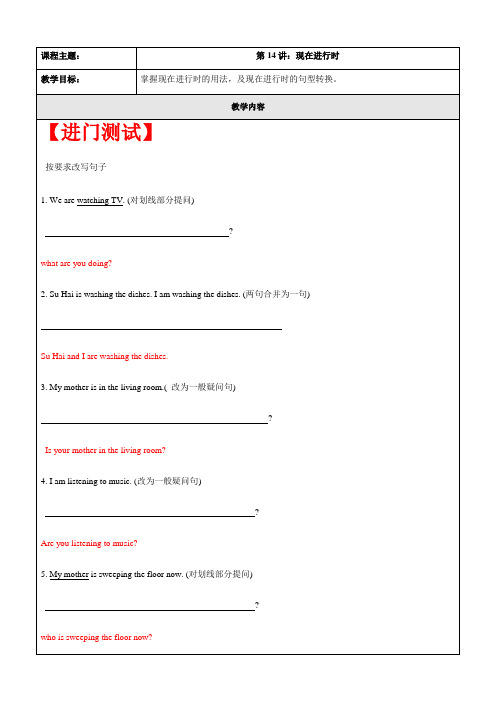
【多元导学】Hey!What are you doing ?嘿!干啥呢?【互动精讲】批注:知识点精讲与练习。
建议时间为60分钟。
现在进行时【知识梳理1】现在进行时的结构和用法I. 现在进行时用来表示现在正在进行或发生的动作。
时间状语为:now, Look! Listen! these days, 时刻(it’s two o’clock)结构为:be动词+动词现在分词II. ★动词加ing的变化规则1. 一般情况下,直接加ing,如:cook-cooking2. 以不发音的e结尾,去e加ing,如:make-making, taste-tasting3. 如果末尾是一个元音字母和一个辅音字母,双写末尾的辅音字母,再加ing,如:run-running,stop-stopping注:小学范围内这类动词主要有:put---putting; sit---sitting; swim—swimming; run---running; stop---stopping; get---getting; begin—beginning; jogging【例题精讲】例1.写出下列动词的现在分词:【巩固练习】根据中文意思完成句子:1. --学生们在干什么?--有一些在打电话,另一些躺在沙滩上。
-- the students ?-- Some on the phone, and others on the beach.2.--“格林先生在看电视吗?” --“不,他在打扫房间。
”--“Mr Green TV?” --“, He the house.”3. 魏芳不是在读书,她在写信。
Wei Fang a book. She a letter.4. 我正在通过收音机学(learn) 英语。
I English on the radio.5. 这个老人每天早上六点钟起床。
The old man at six o’clock in the morning every day.6. 你从哪里来?Where you from?或Where you from?我从美国来。
五升六英语短期语法专题

五升六语法专辑英语基础语法课程练习册1. 语法:一般现在时Warming-up表示经常的,习惯性的动作,常与表示频率的时间副词连用。
1. 表示经常性或习惯性的动作:I get up at six every day.2. 表示事物和人物的特征.状态:The sky is blue.3. 表示客观事实:The earth goes around the sun.关键词:day once, twice, three timesyear four times a weekmonth on Saturdaysevery week on Sundaysmorningafternoonevening句型:1. be 动词的变化肯定式:He is a teacher.否定式:He is not a teacher.一般疑问句:Is he a teacher? -Yes, he is. / No, he isn't.特殊疑问句:What is he?2. 行为动词的变化肯定式:I like pork. 第三人称单数:He likes pork.否定式:I don't like pork. 第三人称单数:He doesn't like pork.一般疑问句:Do you like pork? 第三人称单数:Does he like pork?-Yes, I do. / No, I don't. –Yes, he does. / No, he doesn't.特殊疑问句:What do you like? / What does he like?课堂巩固一. 将下列动词改为第三人称单数形式。
Model: do→ does1. fly _______2. skip _______3. play _______4. wash _______5. go _______6. watch _______7. study _______8. swim _______9. skate _______二. 用所给动词的适当形式填空。
五升六英语讲义
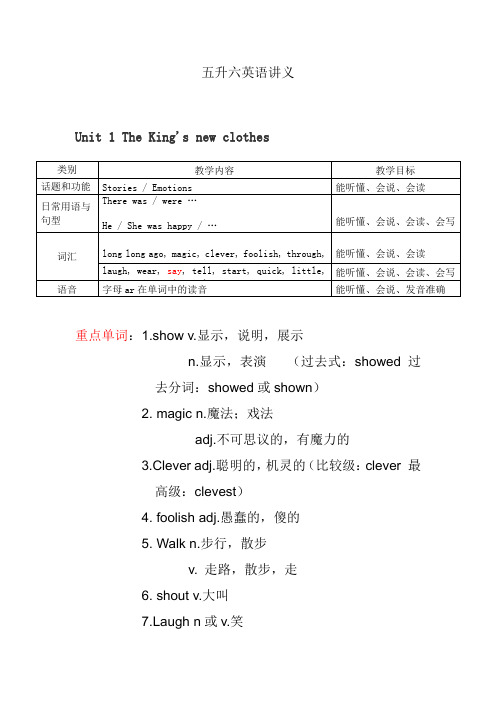
五升六英语讲义Unit 1 The King's new clothes重点单词:1.show v.显示,说明,展示n.显示,表演(过去式:showed 过去分词:showed或shown)2. magic n.魔法;戏法adj.不可思议的,有魔力的3.Clever adj.聪明的,机灵的(比较级:clever 最高级:clevest)4. foolish adj.愚蠢的,傻的5. Walk n.步行,散步v. 走路,散步,走6. shout v.大叫ugh n或v.笑8. point n.要点,得分v.指向9. Pick v.采摘,摘,拾取10.live adj.活的,生动的v.居住,活,度过11. Give v.给,给予12.be (be动词,即am,is are)重点词组:1.make clothes for sb为某人做衣服2. show sb sth 向某人展示某物3. Try on sth 试穿上。
4. walk through穿过5.Look at 看向6.point at 指向7. Live in 住在8.in front of在。
前面9.Give sb sth 给某人什么10. live with sb和某人住一起11. Be nice to sb 对某人很好12.be sick生病了13. Look after 照顾14. turn into变成重点句型:1.the king walked through the city in his new clothes.(walk through表示“穿过”,through指的是穿过某个空间,比如through forest ; inone’s clothes表示穿着谁的衣服)2.they looked at the king and shouted: whatbeautiful clothes!(look at表示看向某人,looked和shouted是同发生的动作,应该保持失态一致!what表示“多么”,不是“什么”的意思。
小学英语五升六暑假讲义专题三----一般过去时(一)译林版三起

暑期专题三一般过去时(一)【概念】1.一般过去时表示过去某个时间里发生的动作或状态;(1) We visited a farm last Sunday.(2) They were students ten years ago.2.一般过去时表示还可以表示过去习惯性、经常性的动作和行为。
They often went to the park on Sundays last year.【时间标志】1. yesterday系列; yesterday morning/afternoon;the day be fore yesterday2. ago系列; three days/weeks/months/years ago3. last系列; in 2008/20194. in+过去年份; last night/week/Sunday/term/year5.其他; just now(刚才);the other day (前几天)【动词过去式的变化规则和不规则变化】A. 规则变化1. 一般情况下, 直接+ ed; playplayed; workworked2. 以不发音e结尾的词, 直接+ d; dancedanced; useused3. 辅音加y结尾的词, 改y为i + ed; studystudied; trytried4. 重读闭音节的词, 双写尾字母+ ed. stopstopped; planplannedB. 不规则变化(需要单独记忆)【基本结构和句式】1. Be型(1)肯定句:主语+ was / were +其他He was at home yesterday.(2)否定句:主语+ was / were + n ot + 其他He was not at home yesterday.(3)一般疑问句:Was / Were +主语+其他Was he at home yesterday?(4)特殊疑问句:特殊疑问词+ was / were +主语+其他Where was he yesterday?2. Do型(1)肯定句:主语+ did +其他I watched TV last night.(2)否定句:主语+ didn’t + 动词原形+ 其他I didn't watch TV last night.(3)一般疑问句:Did + 主语+ 动词原形+其他Did you watch TV last night?(4)特殊疑问句:特殊疑问词+ did + 主语+动词原形+其他What did you do last night?一般过去时专项练习一、写出下列动词的过去式1.am/is ______2. cry________3. read ________4. watch ________5. live _________6. take ________7. spend________8. drink_________9. fly________ 10.ride _______ 11.live _________ 12. give________13. do _______ 14. go ________ 15. have _______ 16 .cook_______17. cut ________ 18. clean _______ 19. think _______ 20. study_________二、用括号内所给词的适当形式填空1. We _________ (enjoy) ourselves at the party last night.2. The teacher told us that the moon_____(travel) around the earth.3. _______ you ______ (go) to the Great Wall last year?4. The old man _______(be)ill and went to see a doctor.5. We ________ (have) a party next Sunday.6. They _________(play) the guitar now.7. Did she ________ (have) supper at home?8. Jack ____________ (not clean) the room just now.9. _________ (be) it cold in your city yesterday?10. How many people ________ (be) there in your class last term?11. It ________ (be) hot yesterday and most children _______ (be) outside.12. There ________ (be) a football match on TV yesterday evening, but I _________ (have) no time to watch it.13. He ate some bread and _________ (drink) some milk.14. ________ he __________ (finish) his homewo rk last night?15. I__________(be) tired yesterday.16. I ___________(gain ) Arts degree last year.17. What _________ you ___________ (do) last night?18. My grandfather _________ (leave) Hong Kong for New York in 1998.19. What _______ he ________ (do) yesterday?20. Last week I _______ (buy) a new bike.21. He ________ (be) here just now.22. He __________ (not find ) his key last night.24. My father __________ (drink) a lot of wine yesterday.24. ________ you ________ (finish) your homework yesterday?25. Her mother __________ (not give) the girl any present.三、句型转换1. He came here last month. (改为否定句)He ______ ________ here last month.2. They played football this morning. (改为一般疑问句并作简略回答)—______ they _______ football this morning?—Yes, they _______./No, they _________ .3. They went to Beijing last year. (就划线部分提问)_________ _________ they ________ last year.4. Tom watched TV last night. (改为一般疑问句)_______ Tom _______ TV last night?5. Mary does homework every day. (用last night 改写句子)Mary ______ ________ ________ __________ .6. My family went to the beach last week. (划线提问)________ ________ ________ family _______ last week?7. I didn’t hav e any friends. (一般疑问句)________ _______ have _______ friends?8. She had many books in the room. (一般疑问句)________ she _________ many books in the room?9. Sally often did some reading in the morning. (否定句)Sally _______ often ______ some reading in the morning.10. She read some books in the room. (否定句)She __________ __________ ________ books in the room.四、改错题1. How is Jane yesterday? _______________________2. He go to school by bus last week. _______________________3. He often goes home at 6:00 last month. _______________________4. I can fly kites seven years ago. _______________________5. Did you saw him just now. _______________________6. Tom wasn’t watch TV last night. _______________________7. I didn’t my homework yesterday. _______________________8. He wait for you three hours ago. _______________________9. Who find it just now ? _______________________10. What did he last week? _______________________五、选择填空( ) 1. Lee ________ his mobile phone at home.A. leaveB. leavesC. leavedD. left( ) 2. _____ he ________ a good rest? No, he didn’t.A. Do, hadB. Did, haveC. Did, hadD. Was, had( ) 3. As soon as he ________, he ______ to his family.A. arrived, writesB. arrived, writtenC. arrive d, wroteD. arriveds, write ( ) 4. Mr. Black was late because he _______ his way.A. lostedB. loseC. losesD. lost( ) 5. When _________ Lee ________ school this morning?A. did, got toB. did, get toC. did, getD. did, got( ) 6. Will you please say it again? I ________ quite _______ you.A. didn’t, hearB. don’t, heardC. didn’t, heardD. don’t, hear ( ) 7. ______ you ________ at six o’clock yesterday?A. Do ,get upB. Did, get upC. Do, got upD. Did, got up( ) 8.What did you see _________?A. nowB. every dayC. these daysD. just now( ) 9.He went into the room and _______ the door.A. lockB. lockingC. locksD. locked( ) 10. —What _____ you _______ last week? —I bought a bag.A. did ,buyB. did , boughtC. do, buyD. do, bought( ) 11. —_____ he ____ his lunch? — Yes, he did.A. Does ,hasB. Does, haveC. Did, haveD. Did, had( )12.—Did the thieves _____ into the car? —No, they______.A. fell, didn’tB. fall(落下), didC. jump(跳), didn’tD. jump, did ( ) 13. When did May e back from Hong Kong? She __ from Hong Kong last Friday.A. e backB. es backC. returned backD. came back( ) 14. ____ she _____ this dictionary in the bookshop nearby last week?A. Did, buyB. Does, buyC. Did, boughtD. Does, buys ( ) 15. He ____ to the station this morning and was______ for the train.A. hurry, in timeB. hurries, on timeC. hurried, in timeD. hurried, at time ( ) 16. Where _____ Uncle Sun yesterday?A. wasB. wereC. didD. does ( ) 17. —Have you seen him today? —Yes, I ____ him this morning.A. seeingB. seeC. seesD. saw( ) 18. He ______ worried when he heard the news.A. isB. wasC. doesD. did( ) 19. There _____ a telephone call for my brother Steven yesterday?A. isB. areC. wasD. were( ) 20. Liu Fengwei _____ three yuan for the lost library book.A. paidB. payC. spentD. lost( ) 21. He ____ in this school in 1958.A. taughtB. teachC. teachesD. teaching( ) 22. They _____ tired so they stopped ____ a rest.A. are, haveB. were, haveC. were, to haveD. are, hav ing( ) 23. Yesterday I _____ in bed all day because I had a fever.A. layB. lieC. laidD. lied( ) 24. It was raining hard when he ____ home.A. gotB. getC. getsD. was getting( ) 25. She said her brother ____ in Beijing. He ______ to Japan on business last week.A. wasn’t, wentB. hasn’t, wentC. wasn’t, goD. isn’t, went一般过去时专项练习答案一、写出下列动词的过去式(略)二、用括号内所给词的适当形式填空1. enjoyed2. travels3. Did; go4. was5. will have6. are playing7. have8. didn’t clean9. Was 10. were11. was; were 12. was; had 13. drank 14. Did finish 15. was16. gained 17. did do 18. left 19. did do 20. bought21. was 22. didn’t find 24. drank 24.Did finish 25. didn’t give三、句型转换1. didn’t e2. Did play ; did; didn’t3. Where did go4. Did watch5. did homework last night6. Where did your go7. Didn’t you have8. Did have9. didn’t do 10. didn’t read any四、改错题1. is was2. go went3. goes went4. can could5. saw see6. wasn’t didn’t7. didn’t didn’t do8. wait waited9. find found 10. he he do五、选择填空DBCDB ABDDA CCDAC ADBCA ACAAA。
- 1、下载文档前请自行甄别文档内容的完整性,平台不提供额外的编辑、内容补充、找答案等附加服务。
- 2、"仅部分预览"的文档,不可在线预览部分如存在完整性等问题,可反馈申请退款(可完整预览的文档不适用该条件!)。
- 3、如文档侵犯您的权益,请联系客服反馈,我们会尽快为您处理(人工客服工作时间:9:00-18:30)。
宝贝梦想空间五升六英语语法辅导资料
一、请写出下列词的复数形式。
city _____ zoo ______country _____ tooth____ mouse _ _ boy_____ broom ______ car __ tree ______horse ______ bus_____ fox _____ branch ____ baby _____ family _____ dish _____ radio _____ photo _____ piano ____ knife_____ leaf _____ life _____ thief _____ man _____ woman ___ __ child __ _ foot this _________ watch______ diary________ day____________ book____________ dress____________ sheep___________ tea_____ box___________ strawberry_________ peach__________ sandwich__________ paper_________ juice__________ water____________ milk__________ rice_________ people fish___________ CD ox___________ deer____________
( )1. The __ in our yard are very beautiful.
A. cloth
B. water
C. flowers
( )2. Tom is one of the Chinese _____ in our school.
A. boy
B. boys
C. boies
( )3. A cat has four ____ , doesn't it?
A. foots
B. feet
C. feets
( )4. There are three ____ and five _____ in the room.
A. American, Japanese B Americans, Japanese C. American, Japanese ( )5. Can you see nine ____ in the picture?
A. fish
B. book
C. horse
( )6. The _____ has two______.
A. boy; watch
B. boy; watches
C. boys; watch
( )7. The _____ are flying back to their country.
A. Germany
B. Germanys
C. Germans
( )8. The girl brushes her _____ every day before she goes to bed.
A. tooths
B. teeth
C. teeths
( ) saw many _____ in the street.
A. peoples ’s
( ) green sweater is his _________.
’s
( )1. They come from different ______
A. country
B. countries
C. a country
D. countrys ( )2. How many ______ do you see in the picture?
A. tomatos
B. tomatoes
C. tomato
D. the tomato ( )3. They are______.
A . woman teachers B. women teachers
C. women teacher
D. woman teacher
( )4. Would you like _______ ,please?
A. two glass of water
B. two glasses of water
C. two glass of waters
D. two glasses of waters
( )5. Most of ______ live in _______.
A. Germans, German
B. German, Germen
C. Germen, Germany
D. Germans, Germany
( )6. There are some ______ in these _______.
A. knifes pencil-boxes
B. knives pencils-box
C. knives pencil-box
D. knives pencils-boxes
( )7. ______ like ______ by air.
A. Greens, travelling
B. The Green, traveling
C. The Greens, travel
D. The Greens, traveling
( )8. I wonder why ______ are interested in action films(武打片).
A. the people
B. people
C. peoples
D. the peoples ( )9. There is no ______ in the plate.
A. apples
B. oranges
C. rice
D. eggs
( ) uncle has three _______.
四.填入所给名词的正确形式
1. I have two____________. (knife)
2. There are many ___________ here. (box)
3. There are many ___________ on the road. (bus)
4. A few ___________ are drawing on the wall. (boy)
______________ are playing football now. (child)
take two _______________ for me. (photo)
like the red ________________.(tomato)
you please clean your _____________ now? (tooth)
you want some _________? (milk)
are ten ___________________in our school. (woman teacher)
答案:
一、请写出下列词的复数形式。
cities zoos countries teeth mice boys brooms cars trees horses buses foxes branches babies families dishes radios photos pianos knives leaves lives thieves men women children feet these watches diaries days books dresses sheep teas boxes strawberries peaches sandwiches papers juice water milk rice people CDs oxen deer fish
二、单项选择
三、选择填空
四
填入所给名词的正确形式
1. knives
teachers。
